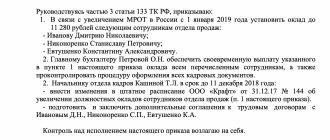What about salary increases?
Increasing wages is a common procedure carried out by employers. Moreover, such an increase can be achieved using different methods:
- by indexing;
- salary increase.
Despite the fact that these methods are similar in their results, their nature is different in essence. Indexation is a guarantee provided at the state level (Articles 130, 134 of the Labor Code of the Russian Federation). The salary increase is voluntary.
The differences between these procedures are discussed in more detail below:
| Criterion | Indexing | Salary increase |
| Need for use | Mandatory | Voluntary |
| Circle of people | Applies to all employees | Does not apply to all employees |
| Causes | Impact of rising prices | Employer's decision |
| Increase size | Regulated at the state level | Set by the employer |
Salary increases in the form of indexation should be applied by all employers. Moreover, one of the conditions for using such an increase is the presence of a mention of this in the collective agreement or other local regulatory act of the enterprise (definition of the Constitutional Court of the Russian Federation dated November 19, 2015 No. 2618-O, letter of Rostrud dated April 19, 2010 No. 1073-6-1). In addition, it is within the competence of each employer to independently establish indexation rules, as well as determine the indexation coefficient itself.
The indexation coefficient (CI) is determined in the following way:
CI = Salary after indexation / Salary before indexation
NOTE! Since indexation is a government measure to bring the income received by citizens into line with the level of current market prices, the value of the CI provided by the employer is recommended to be correlated with the inflation rate for a specific region or country (determination of the St. Petersburg City Court dated March 21, 2011 No. 3866).
At the same time, it is also necessary to adjust the average earnings (AS). Note that the SZ should be adjusted if the wages themselves (salaries and tariff rates) change. If the size of other payments, for example compensation or incentives, has increased, this does not entail the need to adjust the SZ (clause 16 of the Regulations on the specifics of the procedure for calculating the average salary, approved by Decree of the Government of the Russian Federation of December 24, 2007 No. 922, hereinafter referred to as the Regulations).
If you have access to ConsultantPlus, check whether you indexed your average earnings correctly when calculating vacation pay. If you don't have access, get a free trial of online legal access.
Is it necessary to index if the salaries of all employees are increased?
Clause 16 of the Regulations to Resolution No. 922 clearly states that if a company’s wages increase, then it is necessary to recalculate the average earnings.
Since payment for annual leave is made based on average daily earnings, the need for indexation is also relevant in relation to vacation pay.
At the same time, the Regulations contain the procedure in accordance with which you must act when recalculating.
Indexation rules depend on when staff wages increase. Three cases are possible:
- salaries increase in the billing period (12 calendar months preceding the month of the start of annual leave;
- salaries increase in the month when the vacation is taken out;
- the increase occurs while on annual leave.
There is no need to index vacation pay only in one case, if the moment of salary increase occurred before the start of the billing period.
For the purpose of recalculating average income, increases in salaries, tariff rates, and additional payments to rates and salaries are taken into account.
How to calculate the indexation coefficient?
In order to correctly index vacation pay, you first need to calculate the indexation coefficient by which the employee’s payments will be multiplied, taken into account when calculating the average earnings to pay for annual leave.
The coefficient shows how the employee’s salary has changed; it is calculated using the formula presented below.
Formula:
Coeff. ind. = Salary (tariff rate) after increase / Salary (tariff rate) before increase.
That is, in essence, the new increased salary is divided by the former before indexation.
Example:
The employee’s salary before the salary increase was 32,000 rubles, after indexation it was 35,000 rubles.
Coefficient ind. = 35000 / 32000 = 1.093.
This indicator is useful when recalculating average earnings for vacation pay.
The procedure for calculating vacation pay when increasing wages in 2019
The regulation on average earnings considers three possible cases when salaries are indexed in the billing period, in the month the vacation is calculated and while on vacation.
The billing period is a year consisting of calendar months. For the purpose of calculating holiday pay, the year before the beginning of the month in which annual leave begins is taken.
Option 1: Increase in the billing period
If salaries in the organization have been increased this year, then when calculating vacation payments, the accountant must take into account this change in the average salary:
- The indexation coefficient is calculated - the new salary is divided by the old one.
- Payments made in the year before the salary increase are multiplied by a coefficient.
As a result of these calculations, the resulting increase in wages will be applied to all income accrued during the estimated time. Despite the fact that the increase does not occur from the beginning of the billing period, indexation must be taken into account for all payments during this time period.
Such rules are enshrined in clause 16 of the Regulations.
Option 2: Increase in the month the vacation starts
If wages are indexed after the end of the billing period in the month in which the annual holiday begins before it begins, then this point should also affect the calculation of vacation pay:
- The indexation coefficient is calculated.
- The average daily earnings calculated for the year based on actual payments are considered.
- Average daily earnings are multiplied by a coefficient.
Thus, indexation before the start of vacation in this option also applies to all accrued income in the billing period.
Option 3: Promotion while on vacation
The employee goes on vacation, having received vacation pay, calculated based on actual payments for the estimated time. If during the rest period there is an increase in salary, then this point must also be taken into account; recalculation must be made in the following order:
- The number of days from the indexation date to the end of the vacation is counted.
- The coefficient is calculated.
- The average earnings are multiplied by the coefficient for days of rest that occurred after indexation (from paragraph 1).
In this case, the part of the vacation pay that is assigned for the days for which the new salary is valid is subject to recalculation.
Part of the vacation pay is not recalculated until the salary increase.
Calculation examples are given below for all three options.
Example if changes occurred during the billing period
Initial data:
The employee's vacation begins on February 18, 2021 for 28 days. From November 1, 2021, the salary increased from 48,000 to 53,000.
For simplicity, we assume that the year is fully worked without excluded days.
Calculation:
If the vacation begins on 02/18/2020, then the estimated period is from 02/01/2019 to 01/31/2020. During this time period there is a moment of salary increase, which means that this moment must be taken into account when calculating average earnings.
| Calc. period | 01.02.2019 — 31.01.2020 |
| Coefficient | 53000 / 48000 = 1,1 |
| Income for the billing period up to the month of increase, taking into account indexation (from February to October 2019) | 48000 * 9 months. * 1.1 = 475200 |
| Income from the month of increase (from November 2021 to January 2020) | 53000 * 3 = 159000 |
| Total income | 475200 + 159 000 = 634200 |
| Time worked | 29.3 * 12 months = 351.6 |
| Average daily earnings | 634200 / 351,6 = 1803,75 |
| Vacation pay | 1803,75 * 28 = 50505 |
Example, if the changes occurred in the month the vacation began
Initial data:
The start date of the holiday is December 10, 2021 for 28 days. From December 1, 2021, salaries will increase from 30,000 to 35,000.
We will make the calculation provided that the employee did not have any excluded periods.
Calculation:
If the vacation begins on December 10, 2019, then the estimated period is from December 1, 2018 to November 30, 2019. The increase occurs from 12/01/2019, that is, after the end of the calculation period, but before the first day of vacation, which means that indexation should be applied not to the employee’s income, but to the average earnings calculated according to the general rules.
| Calc. period | 01.12.2018 — 30.11.2019 |
| Coefficient | 35000 / 30000 = 1,17 |
| Average earnings | 30000*12 months. / 29.3*12 months = 1023.89 |
| Average earnings taking into account indexation | 1023,89 * 1,17 = 1197,95 |
| Vacation pay | 1197,95 * 28 = 33542,64 |
Example if the increase occurred during rest
Initial data:
The holiday starts from December 15 to 12, 2021 (28 days). Monthly salary for the billing period = 28,000.
From December 1, all salaries are indexed, as a result, the employee’s salary increases from 28,000 to 30,000.
Calculation:
If the vacation begins on November 15, 2019, then the estimated period is from November 1, 2018 to October 31, 2019.
The increase takes place from December 1, 2019, at which time the employee is on annual leave, for which he has already received payment. In accordance with the Regulations on Average Earnings, it is necessary to recalculate part of the vacation pay for the period from 12/01/2019 to 12/12/219 (12 days), since during these periods the new salary amount is already in effect.
| Calc. period | 01.11.2018 — 31.12.2019 |
| Average earnings | 28000*12 months. / 29.3*12 months = 955.63 |
| Vacation pay | 955.63 * 28 days = 26757.64 |
| Coefficient | 30000 / 28000 = 1,07 |
| Average earnings after indexation | 955,63 * 1,07 = 1022,52 |
| Vacation pay for the period from 12/01/2019 - 12/12/2019 | 1022,52 * 12 = 12270,24 |
| Vacation pay for the entire vacation, taking into account the increase in salary | 955.63*16 days. + 12270.24 = 27560.32 |
| Additional payment amount | 27560,32 — 26757,64 = 802,68 |
As a result of the calculations, the employee needs to pay an additional 802.68 rubles.
What is the procedure for wage indexation?
All changes in working conditions must be fixed in the employee’s employment contract. In this connection, when indexing earnings, the employer should certainly enter into an additional agreement with the employee to the employment contract indicating the updated amount of remuneration. In this case, it is important to make reference to the provision of the local act, in accordance with which the change in wages occurred (Article 134 of the Labor Code of the Russian Federation).
How to correctly index wages, see here.
What counts as a salary increase?
Salaries are increased by decision of the manager or on the basis of legislative norms.
The growth of employee incomes is carried out either by increasing their salaries, or after indexing salaries. A salary increase is not mandatory; the decision on this is made by the employer himself. The head of the organization determines the size of such an increase and the list of persons who will receive increased pay.
Indexation means a change in workers' wages taking into account an established coefficient. Wage indexing is a state social guarantee. Its goal is to ensure income growth taking into account inflation. Indexation is mandatory for all subordinate organizations and applies to all employees. Periodic indexing is regulated by Articles 130 and 134 of the Labor Code of the Russian Federation and other legislative standards. How exactly wages are indexed and when wage indexation is used when calculating vacation pay must be enshrined in the local regulations of the institution - the collective agreement, regulations on wages and in labor agreements with each employee (Rostrud Letter No. 1073-6-1 dated 04/19/2010) .
Is it necessary to index vacation pay?
Due to the fact that the calculation of vacation pay depends on the size of the SZ, the indexation carried out in the organization affects the amount of vacation pay.
SZ for the purposes of the Labor Code of the Russian Federation is determined in accordance with Art. 139 Labor Code and Regulations.
According to clause 16 of the Regulations, an increase in the employee’s SZ is carried out with an increase in tariff rates, salaries (official salaries), and monetary remuneration in the organization (branch, structural unit). From the provisions of this norm it follows that the indexation of SZ is carried out if the increase affected all employees of the company. If such an increase is not carried out in relation to at least one employee, then the SZ is not indexed. The rationale for this conclusion can be found in letters from the Ministry of Health and Social Development of Russia dated January 30, 2009 No. 22-2-176 and Rostrud dated October 31, 2008 No. 5920-TZ. Thus, the indexation of vacation pay is influenced by the fact whether the SZ was increased or not.
How to recalculate vacation pay
The reporting period for calculating payments is 12 months preceding the start of the vacation.
Legislative regulations do not stipulate how to index vacation pay when increasing salaries, but when adjusting the amount of payments, certain aspects must be taken into account:
| Order of increase | Recount procedure |
| Salaries increased in the billing period | The CI established in the organization is applied to the average earnings for the entire period, which is taken into account when calculating vacation payments |
| The salary increased not during the pay period, but before the start of the vacation | Average earnings are indexed to the CI value |
| Income growth occurred during the holidays | Average earnings are indexed to CI directly from the date when the salary actually increased |
The calculation procedure itself is carried out as follows:
- We calculate CI.
- We recalculate the average earnings by a coefficient for further calculation of vacation pay.
How is vacation pay indexed?
The indexation of vacation pay depends on the following factors:
- If the salary increase occurred during the period that is used to calculate vacation pay, then the SZ must be adjusted to the CI for the entire billing period.
- If the increase occurred during a period that is not included in the calculation of vacation pay, but precedes the vacation, then the SZ must be indexed for the calculation period.
- In cases where the salary increase occurred on vacation days, the SZ is adjusted from the date of the salary increase.
To index vacation pay, you must use the CI calculated using the above formula.
Note that the calculation period for determining the SZ for vacation pay is 12 months preceding the start date of the vacation.
For more information about the nuances of calculating vacation pay, see the article “What is the calculation period for vacation - vacation experience .
How to calculate the indexation size
Despite the strict regulations, the manager has the opportunity to prescribe the procedure and calculate the index based on his own needs and funding levels. The indexation coefficient, as well as the salary increase coefficient when calculating vacation pay, is determined by the formula:
CI = salary after I / salary before I,
Where:
- CI - coefficient;
- And - indexing.
The indicator of old and new salaries includes all amounts paid monthly to an employee in the form of remuneration for work - compensatory and incentive additional payments and allowances, bonuses and other payments. The index also applies when recalculating the average earnings, which is adjusted when salaries or tariffs change.
The procedure for indexing vacation pay: examples
Let's look at examples of how vacation pay is indexed depending on the indexation period.
Example 1
From June 1, 2021, Markova T.V. was on vacation for 14 days. During the billing period, from June 1, 2021 to May 31, 2021, the employee’s salary was indexed from 20,000 to 25,000 rubles. The indexation date is November 2021. Markova's billing period was fully worked out. She did not receive bonuses or other payments.
To calculate the amount of vacation pay, it is necessary to determine the SZ. To do this, calculate the CI:
CI = 25,000 / 20,000 =1.25
To determine the size of the SZ, it is necessary to divide the billing period into 2 parts: the first part, preceding the increase, was 5 months, from June to October 2021; the second, from November 2020 to May 2021, 7 months. Due to the fact that indexation took place in the billing period, the SZ for calculating vacation pay should be indexed from the beginning of the billing period. Thus, the formula should contain a reflection of indexation for 5 months (20,000 × 1.25 × 5) and the calculation of SZ taking into account the new salary (25,000 × 7).
SZ = (20,000 × 1.25 × 5 + 25,000 × 7) / (29.3 × 12) = 853.25 rubles.
The amount of vacation pay will be: 853.25 × 14 = 11,945.50 rubles.
Example 2
Pushkov A.A. was on vacation from May 17 to May 26, 2021. During the period from May 17, 2021 to May 16, 2021, the employee was not on vacation. The employee’s salary during this period was 759 rubles. On May 22, the organization indexed wages by 5%.
The amount of vacation pay due to indexation must be recalculated starting from May 22.
To calculate the amount of vacation pay, we determine how many days were on vacation before indexation and after indexation: from May 17 to May 21 inclusive - 5 days, from May 22 to May 26 - 5 days. In this case, to calculate vacation pay for the first 5 days, the indexation coefficient will not be applied; for the remainder of the vacation, a coefficient of 1.05 must be used.
Thus, the amount of vacation pay for the entire vacation period will be:
5 × 759 + 5 × 759 × 1.05 = 7779.75 rubles.
That is, the employee’s vacation pay will be recalculated from the moment of indexation.
Using the above examples, you can once again be convinced that the rules that should be followed when indexing vacation pay depend primarily on the moment when the salary indexation was made: before the date of accrual of the corresponding payments or after.
Should average earnings be indexed if the salaries of not all employees of the department were increased? The answer to this question is in ConsultantPlus. And learn the material by getting trial access to the system for free.
Examples of calculating vacation pay in various situations
Example #1. Indexation occurred during the billing period
In August 2015, forwarder of Freight Support LLC V.P. Petrov took another paid leave for 3 weeks (21 calendar days). The billing period will be the period from August 1, 2014 to July 31, 2015. The employee worked fully for the entire period. The salary in 2014 was fixed, the salary was 20,000 rubles. From 02/01/15, salaries for all company employees were increased by 15%, and indexation took place. The new salary was 23,000 rubles. Forwarder Petrov's employment contract does not provide for bonuses.
Since indexation occurred from February 1, 2015, the accountant must calculate the conversion factor: KP = 23000/20000 = 1.15
Is it possible to hold an employer liable if indexation was not carried out?
Some employers, in order not to increase the organization's costs, do not want to index salaries. However, such savings may entail administrative liability for the employer:
- If a local document contains information about wage indexation, but the actual absence of such a procedure, a fine in the amount of 3,000 to 5,000 rubles is imposed on the employer. (Article 5.31 of the Code of Administrative Offenses of the Russian Federation).
- If there is a simultaneous absence of information about indexation in local documents and the indexation itself, a fine for the legal entity employer is from 30,000 to 50,000 rubles, for officials and individual entrepreneurs - from 1,000 to 5,000 rubles. (Part 1 of Article 5.27 of the Code of Administrative Offenses of the Russian Federation).
These are not the only costs that an employer may incur due to the lack of indexation. If an employee, whose interests are infringed by its failure to carry out the work, goes to court, then the employer, in the event of a positive outcome, will have to pay the lost salary for all periods of violation of the law. And the amount of such payment will be obtained by calculating the difference between the indexed salary and the one actually paid (determination of the Primorsky Regional Court dated August 20, 2015 in case No. 33-7280/2015).
Let us note that some arbitrators take the employer’s side and believe that salary indexation is not his responsibility (appeal ruling of the Judicial Collegium for Civil Cases of the Supreme Court of the Republic of Mordovia dated April 30, 2015 in case No. 33-918/2015).
However, there are a number of valid reasons for not indexing. These include:
- the difficult financial situation of the employer (appeal ruling of the Kostroma Regional Court dated May 26, 2014 No. 33-797/2014);
- a good level of employee salaries that does not require an increase (appeal ruling of the Omsk Regional Court dated November 25, 2015 No. 33-8541/2015).
Results
Not every employer is ready to index wages, despite the fact that this is required by law. However, if the enterprise nevertheless decides on such indexation, it is important to follow all the necessary procedures for the correct calculation of payments that are affected by such a change in wages.
Sources:
- Labor Code of the Russian Federation
- Decree of the Government of the Russian Federation dated December 24, 2007 No. 922
You can find more complete information on the topic in ConsultantPlus. Free trial access to the system for 2 days.







